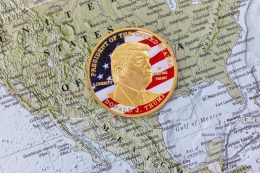California just built the surveillance state into your phone.
Governor Newsom claims he’s protecting children from dangerous technology.
And Gavin Newsom passed one bad law that turns Big Tech into Big Brother.
Newsom signs surveillance package disguised as child protection
Governor Gavin Newsom signed a package of tech regulation bills that hand Sacramento unprecedented control over how Americans use digital platforms.¹
The legislation creates three separate surveillance mechanisms: mandatory warning labels that platforms must display repeatedly, requirements that chatbot companies watch private conversations for concerning content, and a system forcing your phone to verify your age and report it to apps.²
Newsom framed the legislation as protecting children from "unregulated tech."³
"Emerging technology like chatbots and social media can inspire, educate, and connect – but without real guardrails, technology can also exploit, mislead, and endanger our kids," Newsom said.⁴
But the timing tells a different story.
These bills passed just weeks after Newsom vetoed California’s most comprehensive AI safety regulation in September 2024.⁵
When big tech regulation fails, smaller surveillance measures slip through instead.
California builds surveillance architecture into devices
Assembly Bill 1043 represents the most invasive provision in the package.⁶
The law forces operating system providers like Apple and Google to verify users’ ages and transmit that information to apps through a persistent "age signal."⁷
Starting January 1, 2027, your iPhone or Android device must categorize you into an age bracket and make that information available whenever you download or use an app.⁸
Apps can then request this age data and restrict features based on what your operating system reports about you.
The government just mandated that your phone become an age-tracking device that reports your information to every developer who asks for it.
Tech companies including Google, Meta, OpenAI, Snap, and Pinterest backed the bill.⁹
They supported it because it shifts compliance burdens away from individual platforms onto operating system providers.
Hollywood studios opposed the law, arguing age verification at the device level could interfere with how families share streaming accounts.¹⁰
When Big Tech and the government agree on surveillance infrastructure, that should worry everyone.
Real-time monitoring of private conversations becomes law
Senate Bill 243 creates even more disturbing requirements for AI chatbot developers.¹¹
The law mandates that companies operating "companion chatbots" surveil user conversations to detect signs of suicidal ideation or self-harm.¹²
Developers must monitor these private exchanges in real-time and report aggregate statistics annually to the Office of Suicide Prevention.¹³
The statistics must include how often such ideation is detected and how often the chatbot itself raises related topics.¹⁴
Companies will need to build surveillance systems capable of monitoring every conversation between users and chatbots.
California just normalized watching what people say in private under the excuse of mental health intervention.
Chatbots must interrupt conversations with minors every three hours to tell them to take breaks and remind them they’re talking to artificial intelligence, not a person.¹⁵
Platforms must block sexually explicit content for minors and avoid presenting bots as licensed mental health professionals.¹⁶
Government-mandated warning labels on social media
Assembly Bill 56 forces social media platforms to display repetitive government-written warnings to users under 18.¹⁷
The black box-style alerts must appear when users first open a platform each day, again after three hours of cumulative active use, and thereafter at least once per hour of cumulative active use.¹⁸
The warnings will state: "The Surgeon General has warned that while social media may have benefits for some young users, social media is associated with significant mental health harms and has not been proven safe for young users."¹⁹
The result is government-mandated content labeling on digital communication tools.
California modeled this approach on tobacco warning labels.²⁰
James Steyer of Common Sense Media defended the measure: "When we learned alcohol could cause birth defects, we added warning labels for pregnant women. When smoking was linked to cancer, we labeled every cigarette pack."²¹
Except social media platforms aren’t cigarettes.
They’re communication tools where Americans exercise their First Amendment rights.
The government now dictates what warnings appear on those platforms regardless of whether users want to see them.
Pattern of California surveillance expansion
California has been pushing aggressive tech regulation for years under the banner of child protection.
The state passed the Age-Appropriate Design Code in 2022, which required platforms to consider the "best interests of children" when developing products.²²
A federal judge blocked the entire law in 2024, finding it violated the First Amendment by restricting free speech.²³
The judge also found the law would "likely to exacerbate" privacy concerns rather than prevent harm because it required platforms to estimate users’ ages through invasive data collection.²⁴
Instead of accepting that ruling, California repackaged the same control mechanisms with different labels.
Real-time chatbot monitoring does what the vague "best interests" standard couldn’t – puts government eyes on private conversations.
Your iPhone or Android now verifies your age instead of Instagram guessing how old you are.
Sacramento writes the warning labels instead of letting platforms decide what users see.
But the surveillance? That stayed exactly the same.
Sacramento just built the control panel it’ll never give back
Once your operating system tracks age data, that infrastructure exists forever.
Companies already built real-time conversation monitoring systems because California demanded it.
Those capabilities don’t disappear when politicians move on to the next crisis.
Platforms now display whatever warnings Sacramento orders them to show.
What stops officials from adding messages about "misinformation" next year?
Or "extremism" the year after that?
California sold this as protecting children while building tools for total digital control.
Look at the pattern – comprehensive regulation fails, so targeted surveillance measures pass instead.
Newsom vetoed SB 1047 last September after tech companies warned it would drive businesses out of California.²⁵
Thirty days later, he signed bills that hand government control through surveillance mandates rather than direct regulation.
Big Tech supported these laws because age verification infrastructure generates profit and shifts compliance costs to Apple and Google.
The companies that screamed about innovation suddenly love the surveillance state when it serves their bottom line.
Parents worried about their children’s online safety need to ask one question.
Do you trust the same government that gave you NSA surveillance, FBI domestic spying programs, and IRS targeting of conservatives to monitor your family’s private conversations?
California just made that monitoring mandatory while calling it child protection.
The surveillance state doesn’t knock down your door at midnight.
It arrives through bills named the "Digital Age Assurance Act" with promises about keeping kids safe.
Then it never leaves.
¹ "Governor Newsom signs bills to further strengthen California’s leadership in protecting children online," Office of Governor Gavin Newsom, October 13, 2025.
² Ibid.
³ Ibid.
⁴ Ibid.
⁵ "California Gov. Newsom vetoes AI safety bill that divided Silicon Valley," NPR, September 29, 2024.
⁶ "California Enacts Google-Backed Law for App Stores to Verify Age," Bloomberg Government, October 13, 2025.
⁷ Ibid.
⁸ "Newsom Forces Apple And Google To Track Kids’ Ages Under New California Law," The Daily Caller, October 13, 2025.
⁹ Ibid.
¹⁰ Ibid.
¹¹ "California Enacts Law to Shield Children from AI Chatbots," eWeek, October 14, 2025.
¹² Ibid.
¹³ Ibid.
¹⁴ Ibid.
¹⁵ "Newsom signs California AI chatbots bill," Axios, October 13, 2025.
¹⁶ "California Enacts Law to Shield Children from AI Chatbots," eWeek, October 14, 2025.
¹⁷ "Bill Text – AB-56 Social media: warning labels," California Legislature, 2025.
¹⁸ Ibid.
¹⁹ Ibid.
²⁰ "In Victory for Kids and Families, Newsom Signs Online Safety Protections into Law," Common Sense Media, October 13, 2025.
²¹ Ibid.
²² Meetali Jain, "Kids online safety legislation getting a new look in 2024," The Washington Post, January 2, 2024.
²³ Ibid.
²⁴ Ibid.
²⁵ "California Gov. Newsom vetoes AI safety bill that divided Silicon Valley," NPR, September 29, 2024.
















